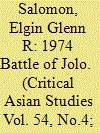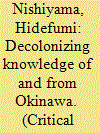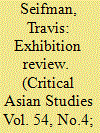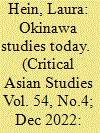|
|
|
Sort Order |
|
|
|
Items / Page
|
|
|
|
|
|
|
| Srl | Item |
| 1 |
ID:
188587


|
|
|
|
|
| Summary/Abstract |
Addressing the limitations of the dominant historiography of the Martial Law period (1972–1986) of the Philippines in Mindanao and the Sulu archipelago, this article provides testimonial narratives of witnesses and survivors of the 1974 Battle of Jolo as a counter-history. Tausug identity has been constructed and depicted by examining how the experiences of both Christian and Muslim Tausug shifted from cooperation to violence after this battle. The imposition of Martial Law and the 1974 Battle of Jolo not only caused displacement, property destruction, and casualties, it significantly contributed to the animosities between Christian and Muslim Tausugs that continue until the present.
|
|
|
|
|
|
|
|
|
|
|
|
|
|
|
|
| 2 |
ID:
188584


|
|
|
|
|
| Summary/Abstract |
This paper explores the militarized situation of Okinawa Island and the ongoing struggles and challenges that Okinawans continue to confront. Particular focus is placed on how Okinawans challenge dominant colonial forms of knowledge, which assert that the U.S. military presence on the island is beneficial for Okinawan and Japanese people. After contextualizing Okinawa Island within contemporary American imperial geopolitics and outlining the current state of the island, the paper looks at three different, yet closely integrated, ways in which Okinawans, led by activists and progressive local officials, challenge the dominant narrative on the U.S. military. By questioning dominant assumptions about security, a base-dependent economy, and Okinawans’ indigenous status, these movements contribute to the decolonization of knowledge, an important step toward the demilitarization of the island. The paper concludes with a discussion of remaining challenges for decolonial knowledge production.
|
|
|
|
|
|
|
|
|
|
|
|
|
|
|
|
| 3 |
ID:
188585


|
|
|
|
|
| Summary/Abstract |
The exhibition “Portraits of Ryukyu,” held at the Okinawa Prefectural Art Museum from November 2021 through January 2022, featured works by sixteen artists with close ties to Okinawa, highlighting the diversity of themes, approaches, styles, and media contained within the category of modern and contemporary Okinawan art, and expanding understandings of that canon. The fifteen women and one x-gender artist featured in the exhibition, some of whom were born and raised in Okinawa and some abroad, some with mixed ethnic backgrounds and others with Japanese backgrounds but trained and educated in Okinawa, address not only themes of gender, war, tradition, identity, and the ongoing U.S. military presence in the islands, but also of family, memory, modernity, labor, consumerism, and of historical and contemporary ties with the experiences of people in Taiwan, Vietnam, Hawai’i, and elsewhere.
|
|
|
|
|
|
|
|
|
|
|
|
|
|
|
|
| 4 |
ID:
188582


|
|
|
|
|
| Summary/Abstract |
The treaty that the Ryukyu Kingdom signed with the US government in 1854 was crucial for understanding cooperation between the US and Japanese governments when the latter annexed the Ryuku Islands in 1879 (an episode known as the Ryukyu shobun). The article explores how Japan-US negotiations over treaty rights facilitated Japan’s ambitions in the Ryukyus, Ogasawara Islands, and Korea, as well as their confrontation when the US annexed the Kingdom of Hawai’i. By the early twentieth century, these two powers had mutually accepted each other’s territorial acquisitions and, in so doing, built their own empires and brought stability to East Asia and the Pacific. Reviewing the informal agreement between Japan and the US during the annexation of the Ryukyus, we can better appreciate how the first shobun set the stage for later events.
|
|
|
|
|
|
|
|
|
|
|
|
|
|
|
|
| 5 |
ID:
188586


|
|
|
|
|
| Summary/Abstract |
In 2019, the government of Taiwan legalized same-sex marriage, the first to do so in Asia. Yet, despite its celebration as a sign of liberal progress, legalization appears at odds with the results of referendums that show a majority of Taiwan citizens oppose LGBTQ acceptance, following a steady decline in tolerance for LGBTQ people in Taiwan. To explain this, this article adopts a Goffmanian micro-sociological approach to interrogate LGBTQ experiences of stigma and discrimination in their networks. Using narrative and go-along interviews with LGBTQ people in Kaohsiung, Taiwan in 2019, this article shows (1) latent forms of discrimination in families and at workplaces, (2) the intensification of discriminatory scrutiny within these spaces in the wake of legalization, (3) mental health consequences, and (4) social enclaves that offer some reprieve from discriminatory pressures. This article identifies a need for greater resource allocation to create safe spaces for members of the LGBTQ community and anti-discrimination policies to combat the capillary forms of discrimination that have arisen after same-sex marriage legalization.
|
|
|
|
|
|
|
|
|
|
|
|
|
|
|
|
| 6 |
ID:
188581


|
|
|
|
|
| Summary/Abstract |
The recent explosion of work on Okinawa focuses attention on Okinawans in Japan’s empire, the diaspora, the American postwar order, and the more distant past. Another major topic is the multiple ways that individuals experience their relationship to Okinawan identity. This research matches the energy and creativity of Okinawan culture today. Popular frustration with the presence of U.S. military bases, enabled by the Japanese government, remains an inescapable issue in the background.
|
|
|
|
|
|
|
|
|
|
|
|
|
|
|
|
| 7 |
ID:
188583


|
|
|
|
|
| Summary/Abstract |
The destruction of Okinawa after the Pacific War led Okinawans to look for new interpretations of their past to overcome the hardships of the present and imagine a new future. Although scholars have recently examined Okinawans’ memory politics, they have paid little attention to the history of Okinawans in South America and their memory construction during the American occupation of the Ryukyu Islands between 1945 and 1972. To fill this gap, this article analyzes Okinawans’ diasporic memory narratives in Argentina in conjunction with transnational memories circulating between 1945 and 1965. Community leaders in Argentina during this period intended to construct a compelling remembrance narrative that could support their identity claims in the face of an uncertain future for their home islands. While this process was shaped by existing transnational discourses, Okinawan immigrants in Argentina negotiated and accepted only those ideas that fit their local agenda and served as sources of diasporic identity and pride. Even if Okinawan immigrants claimed to be Japanese, these memories need to be analyzed as strategies to rebalance asymmetrical power relationships within Japanese immigrant society.
|
|
|
|
|
|
|
|
|
|
|
|
|
|
|
|
|
|
|
|
|